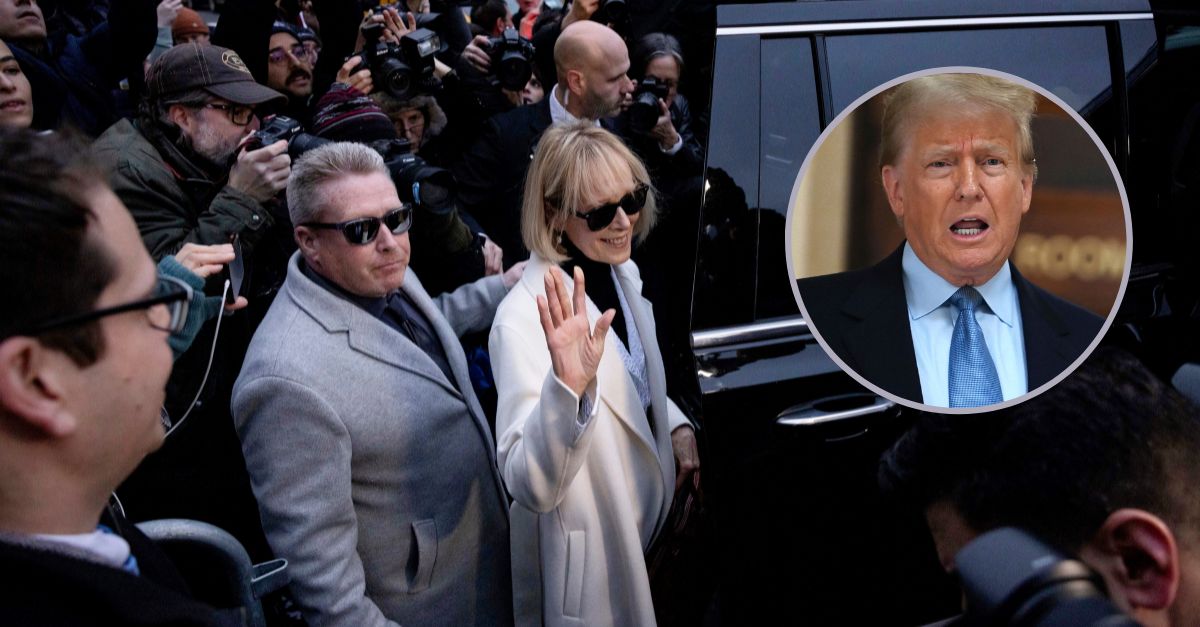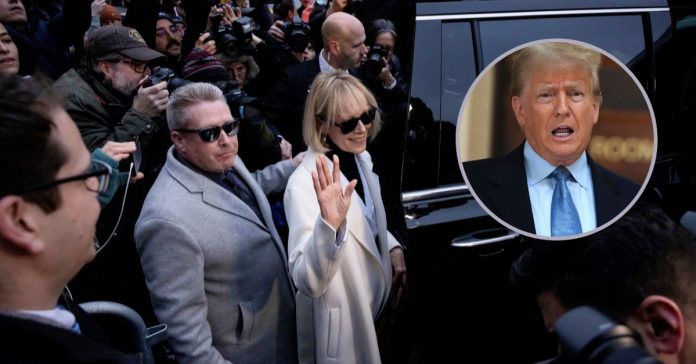
E. Jean Carroll leaves Federal court, Jan 26, 2024, in New York. (AP Photo/Yuki Iwamura. File). Inset: ANUARY 26th 2024: Former president Donald Trump is ordered by jury to pay $83.3 million to columnist E. Jean Carroll after being found liable for defamation. /Andrea Renault/STAR MAX/IPx 2023 10/18/23
Lawyers for Donald Trump maintain that an “erroneous” jury instruction and the judge’s decision to exclude the former president’s testimony about his “state of mind” are enough to support their latest bid for a new E. Jean Carroll trial following an $88.3 million verdict finding him liable for defamation.
Trump, after being found liable for defaming and sexually assaulting Carroll in a prior case, went on to lose a second defamation case in January for statements he made denying the sexual assault allegations on June 21, 2019 and the day after. Now he is seeking a do-over of the trial.
The Federal Rules of Civil Procedure explain that Rule 50(b) permits “a renewed motion for judgment as a matter of law” after trial and “may include an alternative or joint request for a new trial under Rule 59,” which is why Trump has submitted a Rule 59 filing in tandem with the Rule 50 motion.
The Rule 50 filing argued that the plaintiff’s claims were legally deficient to a degree that should be “fatal to Carroll’s case.” Specifically, the lawyers asserted that Carroll did not prove that “disparaging” comments from third parties after her story was published in The Cut on June 21, 2019, were traceable to Trump’s denials.
“[S]he cannot fill the gap between the publication of her claims in The Cut and President Trump’s statements five hours later. The chronology is thus insurmountable and fatal to Carroll’s case. That President Trump’s statements came after third parties sent disparaging comments to Carroll means that he could not have caused them—which undermines Carroll’s causation argument,” the filing said.
Trump lawyers said the online hate mail Carroll received was the fault only of “third parties independently reacting” to her claims, meaning she “cannot recover” damages “without proving that the injury was sustained wholly or in part by a cause for which defendant was responsible.”
In their Rule 59 filing seeking a new trial, Trump’s attorneys took issue with how Senior U.S. District Judge Lewis Kaplan instructed the jury and how the jurist ruled on the former president’s testimony, just as they did in a previous filing that said barring Trump testimony and erroneously instructing the jury on “common-law malice” were “independently sufficient to taint the jury verdict and warrant a new trial.”
“Carroll fails to cite a single case suggesting that a defamation plaintiff can recover punitive damages where injuring the plaintiff was not the defendant’s sole motivation,” the filing said. “Her cases did not consider whether common-law malice requires that intent to injure the plaintiff be the defendant’s sole motive.”
The lawyers said that Trump’s desire to defend himself was what motivated his statements. They also said he was not allowed — but should have been permitted — to submit testimony in the case.
“Trump was erroneously precluded from presenting highly relevant evidence regarding his motivation,” the Trump team said. “The erroneous instruction was deeply harmful, thus meeting the applicable standard.”
At the end of the filing, Trump challenged the punitive damages award as excessive and said the $148 million defamation judgment that sent Rudy Giuliani into bankruptcy was not helpful to Carroll’s case:
Carroll also attempts (at 35), and fails, to rely on comparator cases. Her focus on two out-of-circuit cases underscores that this award is out of step with similar cases in this jurisdiction. In any event, she mischaracterizes those cases. Freeman v. Giuliani involved two plaintiffs; the punitive damages award was thus $37.5 million on a per-plaintiff basis. See Verdict Form, Freeman v. Giuliani, No. 21-cv-3354 (Dec. 15, 2023), ECF No. 135. That is almost half this award. Moreover, the damages in Freeman—unlike here—comply with a roughly 1:1 ratio in both the aggregate and a per-plaintiff basis.
Read the latest Trump filings here and here.
Have a tip we should know? [email protected]

